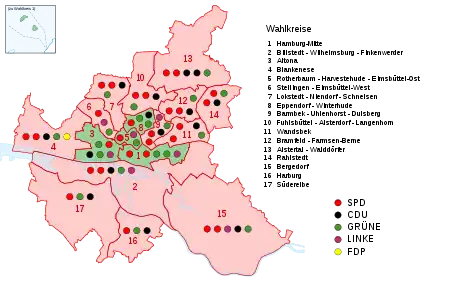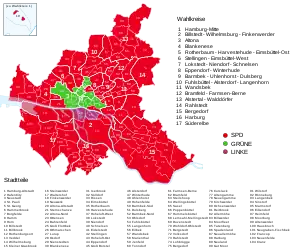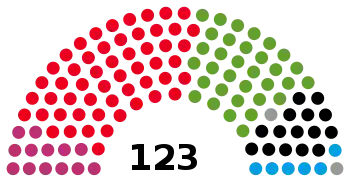2020 Hamburg state election
The 2020 Hamburg state election was held on 23 February 2020 to elect the members of the 22nd Hamburg Parliament. The outgoing government was a coalition of the Social Democratic Party (SPD) and The Greens led by First Mayor Peter Tschentscher.
| |||||||||||||||||||||||||||||||||||||||||||||||||||||||||||||||||||||||||||||
All 123 seats in the Hamburg Parliament 62 seats needed for a majority | |||||||||||||||||||||||||||||||||||||||||||||||||||||||||||||||||||||||||||||
|---|---|---|---|---|---|---|---|---|---|---|---|---|---|---|---|---|---|---|---|---|---|---|---|---|---|---|---|---|---|---|---|---|---|---|---|---|---|---|---|---|---|---|---|---|---|---|---|---|---|---|---|---|---|---|---|---|---|---|---|---|---|---|---|---|---|---|---|---|---|---|---|---|---|---|---|---|---|
| Turnout | 4,054,861 (63.2%) | ||||||||||||||||||||||||||||||||||||||||||||||||||||||||||||||||||||||||||||
| |||||||||||||||||||||||||||||||||||||||||||||||||||||||||||||||||||||||||||||
 | |||||||||||||||||||||||||||||||||||||||||||||||||||||||||||||||||||||||||||||
| |||||||||||||||||||||||||||||||||||||||||||||||||||||||||||||||||||||||||||||
Despite losses, the SPD remained comfortably in first place with 39% of votes. The Greens doubled their vote share to 24%, becoming the second largest party in the state Parliament for the first time.[2] The opposition Christian Democratic Union (CDU) suffered their worst ever result in Hamburg, and their worst result in any state election since 1952, falling to third place with 11% of votes.[3] The Left achieved a small upswing and remained in fourth place. The Alternative for Germany (AfD) narrowly cleared the 5% electoral threshold, recording a decline compared to its previous result for the first time in any state or national-level election. The Free Democratic Party lost a third of its vote share and fell narrowly short of the 5% electoral threshold, in total winning only one seat from a direct constituency.
The SPD–Green government was returned with an increased majority of 87 seats, comprising 71% of the Parliament. The coalition was subsequently renewed.[4] Peter Tschentscher was re-elected Mayor on 10 June.[5]
Issues and campaign
Federal
The Hamburg state election was overshadowed by the Thuringia government crisis,[6] the resignation of Annegret Kramp-Karrenbauer as federal CDU leader,[7] and a terrorist attack targeting immigrants in Hanau which took place four days before the election.
Electoral system
The elections were conducted under a list proportional system in the same manner as the prior election. 71 seats were awarded directly in the 17 multi-mandate constituencies (of between 3-5 seats each) via open constituency lists, and the remaining 50 via at-large open state lists (German: landesliste) based on percentage of the overall vote with a 5% electoral threshold.
Each voter had a total of ten votes: five constituency votes for the direct candidates in the constituency, and five at-large votes for candidates on the state lists (or for state lists in their entirety). The five votes could be amassed all on one person, party, or list (accumulation) or could be distributed/split between different candidates, parties, or lists as desired (panachage). Voting privileges were passively awarded, meaning anyone over the age of 18 meeting eligibility requirements was automatically enrolled.
Parties
The table below lists parties represented in the 21st Hamburg Parliament.
| Name | Ideology | Leader(s) | 2015 result | |||
|---|---|---|---|---|---|---|
| Votes (%) | Seats | |||||
| SPD | Social Democratic Party of Germany Sozialdemokratische Partei Deutschlands |
Social democracy | Peter Tschentscher | 45.6% | 58 / 121 | |
| CDU | Christian Democratic Union of Germany Christlich Demokratische Union Deutschlands |
Christian democracy | Marcus Weinberg | 15.9% | 20 / 121 | |
| Grüne | Alliance 90/The Greens Bündnis 90/Die Grünen |
Green politics | Katharina Fegebank | 12.3% | 15 / 121 | |
| Linke | The Left Die Linke |
Democratic socialism | Cansu Özdemir | 8.5% | 11 / 121 | |
| FDP | Free Democratic Party Freie Demokratische Partei |
Classical liberalism | Anna-Elisabeth von Treuenfels-Frowein | 7.4% | 9 / 121 | |
| AfD | Alternative for Germany Alternative für Deutschland |
German nationalism Right-wing populism |
Dirk Nockemann | 6.1% | 8 / 121 | |
Opinion polling
| Polling firm | Fieldwork date | Sample size |
SPD | CDU | Grüne | Linke | FDP | AfD | Others | Lead |
|---|---|---|---|---|---|---|---|---|---|---|
| 2020 state election | 23 Feb 2020 | – | 39.2 | 11.2 | 24.2 | 9.1 | 4.9 | 5.3 | 6.1 | 15.0 |
| Forschungsgruppe Wahlen | 19–20 Feb 2020 | 1,184 | 39 | 12 | 24 | 8.5 | 5 | 6 | 5.5 | 15 |
| INSA | 12–17 Feb 2020 | 1,006 | 38 | 13 | 23 | 8 | 5 | 7 | 6 | 15 |
| Universität Hamburg | 2 Jan–14 Feb 2020 | 1,004 | 34 | 12 | 32 | 7 | 6 | 5 | 5 | 2 |
| Forschungsgruppe Wahlen | 11–13 Feb 2020 | 1,128 | 37 | 13 | 25 | 8 | 4.5 | 7 | 5.5 | 12 |
| Infratest dimap | 10–12 Feb 2020 | 1,003 | 38 | 14 | 23 | 8 | 5 | 6 | 6 | 15 |
| Infratest dimap | 30 Jan–4 Feb 2020 | 1,000 | 34 | 14 | 27 | 8 | 5 | 7 | 5 | 7 |
| Trend Research Hamburg | 24–29 Jan 2020 | 672 | 33 | 14 | 24 | 10 | 7 | 7 | 5 | 9 |
| Infratest dimap | 16–21 Jan 2020 | 1,002 | 32 | 16 | 27 | 8 | 6 | 7 | 4 | 5 |
| Infratest dimap | 2–7 Jan 2020 | 1,000 | 29 | 15 | 29 | 9 | 7 | 7 | 4 | Tie |
| Forsa | 18 Dec 2019–2 Jan 2020 | 1,009 | 29 | 16 | 26 | 10 | 7 | 7 | 5 | 3 |
| Trend Research Hamburg | 27–31 Dec 2019 | 678 | 32 | 13 | 23 | 13 | 8 | 8 | 4 | 9 |
| Civey | 22 Nov–20 Dec 2019 | 2,041 | 30.4 | 13.6 | 24.1 | 13.7 | 7.4 | 7.5 | 3.3 | 6.3 |
| Infratest dimap | 11–16 Dec 2019 | 1,004 | 28 | 17 | 26 | 11 | 6 | 7 | 5 | 2 |
| Trend Research Hamburg | 5–10 Nov 2019 | 652 | 32 | 13 | 23 | 12 | 7 | 8 | 4 | 9 |
| INSA | 23 Oct–4 Nov 2019 | 1,020 | 25 | 17 | 26 | 12 | 8 | 8 | 4 | 1 |
| Trend Research Hamburg | 6–11 Sep 2019 | 618 | 28 | 14 | 28 | 11 | 6 | 9 | 4 | Tie |
| 2019 European election | 26 May 2019 | – | 19.8 | 17.7 | 31.2 | 7.0 | 5.6 | 6.5 | 12.2 | 11.4 |
| pmg – policy matters | 6–16 May 2019 | 1,002 | 30 | 16 | 22 | 11 | 9 | 10 | 2 | 8 |
| Universität Hamburg | 6 Jan–2 Mar 2019 | 1,069 | 35 | 15 | 29 | 9 | 6 | 4 | 3 | 6 |
| Infratest dimap | 18–21 Feb 2019 | 1,005 | 31 | 17 | 22 | 10 | 8 | 8 | 4 | 9 |
| Forsa | 27 Dec 2018–3 Jan 2019 | 1,004 | 30 | 14 | 24 | 11 | 9 | 7 | 5 | 6 |
| Forsa | 19 Mar–4 Apr 2018 | 1,001 | 36 | 16 | 18 | 12 | 7 | 7 | 4 | 18 |
| pmg – policy matters | 23 Feb–2 Mar 2018 | 1,025 | 28 | 22 | 15 | 14 | 8 | 10 | 3 | 6 |
| 2017 federal election | 24 Sep 2017 | – | 23.5 | 27.2 | 13.9 | 12.2 | 10.8 | 7.8 | 4.5 | 3.7 |
| Universität Hamburg | 8 Sep–17 Nov 2016 | 1,004 | 48 | 18 | 16 | 8 | 5 | 4 | 2 | 30 |
| Infratest dimap | 31 Mar–5 Apr 2016 | 1,000 | 39 | 18 | 15 | 11 | 6 | 8 | 3 | 21 |
| Trend Research Hamburg | 14–18 Jan 2016 | 759 | 37 | 14 | 13 | 10 | 8 | 13 | 5 | 23 |
| 2015 state election | 15 Feb 2015 | – | 45.6 | 15.9 | 12.3 | 8.5 | 7.4 | 6.1 | 4.2 | 29.7 |
Election result

At one polling booth in Langenhorn, the results for the FDP and Greens were accidentally reversed, meaning the preliminary results placed the FDP only 121 votes above the threshold. The mistake was corrected in the official count which took place over 24 hours later.[10] Exit polls suggested that AfD would miss the threshold while FDP would exceed it, leading to early press reports of an AfD defeat and exclusion of its politicians from post-election debates.[11]
 | |||||||
| Party | Votes | % | +/-pp | Seats | +/- | Seats % | |
|---|---|---|---|---|---|---|---|
| Social Democratic Party (SPD) | 1,591,098 | 39.2 | 54 | 43.9 | |||
| Alliance 90/The Greens (Grüne) | 980,361 | 24.2 | 33 | 26.8 | |||
| Christian Democratic Union (CDU) | 452,372 | 11.2 | 15 | 12.2 | |||
| The Left (Linke) | 368,471 | 9.1 | 13 | 10.6 | |||
| Alternative for Germany (AfD) | 214,596 | 5.3 | 7 | 5.7 | |||
| Free Democratic Party (FDP) | 201,162 | 4.9 | 1 | 0.8 | |||
| Die PARTEI (PARTEI) | 56,775 | 1.4 | 0 | ±0 | 0 | ||
| Volt Germany (VOLT) | 52,241 | 1.3 | 0 | ±0 | 0 | ||
| Others | 137,785 | 3.4 | 0 | ±0 | 0 | ||
| Total | 4,054,861 | 100.0 | 123 | ||||
| Voter turnout | 63.2 | ||||||
Government formation
Mayor Tschentscher stated that exploratory talks with the Greens were "the first priority", but that "we will also - if the majorities are confirmed - approach the CDU and hold a conversation." Marcus Weinberg of the CDU stated he was "ready for talks" with the SPD. Lead candidate for the Greens Katharina Fegebank called for "More red-green, with strong greens in the government." Cansu Özdemir of The Left stated her party wished to remain a strong opposition force.[12]
The SPD and Greens came to a coalition agreement at the end of May. The SPD took 7 ministries and the Greens 4, a net gain of one for the Greens.[4] The vote for Mayor took place on 10 June, and Tschentscher was re-elected Mayor with 87 votes in favour, 34 against, and 2 abstentions. The new cabinet was also approved with 83 votes in favour, 38 against, and 2 abstentions.[5]
References
- "Hamburger: Am 23. Februar 2020 neue Bürgerschaft wählen". Archived from the original on 2019-05-05. Retrieved 2019-05-05.
- "Merkel 'slumps in Hamburg as Greens surge'". BBC News. 2020-02-23. Retrieved 2020-02-24.
- "Merkel's CDU suffers worst ever result in Hamburg elections". The Guardian. Reuters. 2020-02-23. ISSN 0261-3077. Retrieved 2020-02-24.
- "Regierungbildung in Hamburg: Grüne benennen Senatoren". NDR.de. 31 May 2020.
- "Bürgerschaft wählt Tschentscher und bestätigt Senat". Ndr.de. 10 June 2020.
- "Germany's FDP to seek dissolution of Thuringia state assembly: source". Reuters. 2020-02-06. Retrieved 2020-02-24.
- "Merkel's crisis-hit CDU launches leadership race". Yahoo News. 2020-02-24. Retrieved 2020-02-24.
- "Hass-Welle gegen FDP 800 Zerstörte Plakate und Parteiaustritte in Hamburg (in German)". Hamburger Morgenpost. 2020-02-10. Retrieved 2020-02-24.
- "Bereits 800 FDP-Wahlplakate in Hamburg zerstört (in German)". Welt. 2020-02-24. Retrieved 2020-02-24.
- "Hamburg-Wahl 2020: Katastrophe für FDP besiegelt - Merz spricht von „Desaster" für CDU (in German)". Merkur.de. 2020-02-24. Retrieved 2020-02-24.
- "Hamburger Bürgerschaftswahl: Darum lagen die Prognosen für die AfD so daneben (in German)". Welt. 2020-02-24. Retrieved 2020-02-24.
- "Was sagen Hamburger Politiker zum Wahlausgang?". NDR.de. 23 February 2020.

.jpeg.webp)

_by_Sandro_Halank%E2%80%933.jpg.webp)

